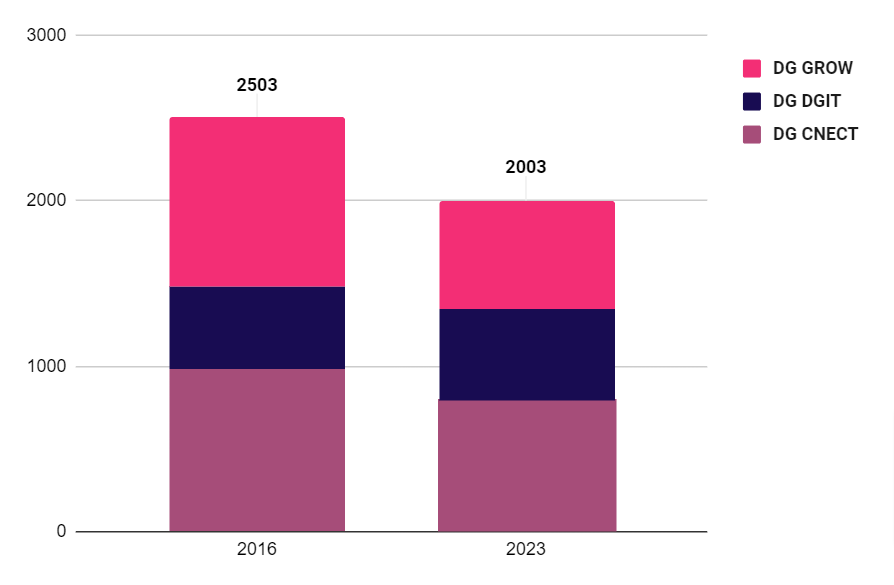11 Ideas To Get The Next EU Commission Off To A Flying Start
In December 2019, Ursula von der Leyen’s vision for ‘a Union that strives for more’ was put front and centre as a brand new College of Commissioners took office. Within the first 100 days coming into office, we saw the announcement of several major pieces of legislation and strategies that put the climate crisis at the heart of the Commission Agenda, but that also contained early mentions of what became landmark digital legislation that have set the stage for a more secure and human-centric digital future.
It was a powerful beginning, but global crises quickly put this vision to the test – first with COVID19, then the energy crisis, and then the invasion of Ukraine. As we observed in our analysis of the recent ESPAS Global Trends Report, what we know is that further destabilising shocks are likely in the coming years, but such crises can be modelled and prepared for. The next Commission must take strides toward preparedness and resilience.
The collective focus has shifted from climate mitigation to complex questions of geopolitics, competitiveness, and regional stability. A red thread that ties all those questions together is the challenges of securing the benefits of technological innovations – from clean technologies to advanced AI systems – for European citizens while addressing the systemic risks that come with such powerful emerging technologies.
As we gear up for the so-called ‘Implementation Commission’, all eyes turn, once again, to that first 100 days. In this piece, ICFG experts lay out the big ideas we believe will put President von der Leyen’s second term on the right track with regards to powerful emerging technologies.

Technology and security
EU Biosecurity Nexus: Design a comprehensive EU Biosecurity Strategy, clearly outlining mechanisms to bridge existent and missing EU competencies in research, health, and defence. The strategy should aim to streamline and build on current capacity and structures at HERA, EUHTF, and ERCC and to determine clear mandates for action and responsibility sharing amongst DGs. The strategy should be developed into the broader context of strengthening EU defence capacity and should consider building relevant partnerships and exchanging best practices with existing biosecurity agencies in other partner countries.
SafeTech: Biosecurity Research Framework: Allocate specific EU Research Funding to dedicated research focused on analysing biosecurity risks associated with emerging technologies (from AI to genomics). The research should consider deliberate or accidental technology misuse scenarios and evaluate possible mitigation and response strategies. Any identified high-risk aspects should be followed by further considerations for research funding regulation or dual-use research classification.
EU Climate Security Strategy: Design a comprehensive EU strategy on climate security, outlining response options for major disruptions such as a halt of Atlantic meridional circulation, atmospheric destabilisation from polar ice melt, or unilateral climate interventions with regional or global impacts. This strategy should utilise the foresight capabilities of EUISS and EEAS, along with the expertise of ESA, ERC, JRC, and EDA, and leverage European research through Horizon Europe to reflect the full risk-management landscape for climate and potential interventions. It should inform defence, infrastructure, adaptation, trade (Global Gateway initiative), and migration policies, enhancing the EU’s strategic capabilities to anticipate and respond to developments that can occur within years.
Responsible innovation
CERN for GPAI Safety: Establish a pan-European AI safety research program, tasked with developing a comprehensive science of how to safely develop general-purpose AI systems. This will enable Europe to shape the future of AI based on European strengths and values, while also addressing the current shortfall of AI safety funding globally, where only 2% of AI R&D is used for safety purposes.
Climate Interventions Transparency Hub: Transparent information on high-stakes climate interventions, such as solar radiation modification and polar interventions, is urgently needed as the climate crisis worsens and commercial actors are planning private tests in the atmosphere. No such system exists globally. Without EU oversight, these developments raise risks to Green Deal objectives and international security. Leveraging EESA’s satellite monitoring and the Horizon Europe research ecosystem, the EU will launch an international facility to record climate intervention research and deter clandestine activities. This facility will include open data, protocols, and funding information, positioning the EU as a leader in preventing unilateral actions that threaten global security.
A European Strategy on Neurotechnology: With industrial policy ramping up around the world, Europe needs a strategy on neurotechnology that ensures it will stay competitive while guaranteeing the respect of European values and fundamental rights – particularly data privacy – for all of its citizens. As the field of neurotechnology is moving very quickly, there is a major need for inclusive public engagement, foresight, and anticipatory governance of these technologies to mitigate against possible threats to privacy, security, and liberty. This strategy would exist at the interface of the previous Commission’s achievements on digital, health, and industrial action, and be a natural next phase of the policy agenda.

Boosting Europe’s tech industry
A European Chief Operating Officer: The “implementation Commission” will walk its digital talk, by building competitiveness not only in Europe but within Institutions. To achieve that vision, the Commission will create a Chief Technologist Office, tasked with driving the internal side of key technology initiatives: from the adoption of AI, to interoperability of digital services, to the federation of working methods and procurement processes across institutions, and advisory on investments in critical technologies. Read more on this proposal here.
Scoping EU-wide advance market commitments: reduce market risk for European innovators by empowering EU member states to pre-commit to purchasing not-yet-invented technologies with outsized societal benefits (e.g., in climate or health – similar mechanisms were used to fast-track vaccine development during the COVID-19 pandemic.
European Deep Tech strategy review: Following the 2023 recommendation to conduct a risk assessment on critical technologies, the Commission will conduct a review of relevant European investments. The purpose of this review is fourfold:
- Identify technological areas where the EU has a comparative advantage. Airbus is a success story because it concentrated capital, talent, and scale to create a European champion where Europe had a distinctive advantage.
- Extend the investment horizon of deep tech to at least 15 years. In areas such as quantum computing, the 10-year cycle typical to most EU funding instruments is obsolete.
- Activate dormant capital. Greater focus and clarity will encourage pension funds to participate as strategic co-investors. This would be in line with the Savings and Investment Union envisaged by Enrico Letta in his report on the future of the Single Market, which aims to retain European private savings and attract additional resources from abroad.
- Simplify access to public funding for startups. Startups in critical technology areas will benefit from fast tracks to procurement, including dedicated investment managers that ensure that the investment portfolio tracks against the long-term funding objectives of the Union.
EU Biotech Act: Address the issue of the extremely fractioned biotech R&D Industry in Europe to make better use of its potential in healthcare, agriculture and energy sectors and to improve European competitiveness. Work towards harmonised biotech regulation across member states, regional centres of excellence for clinical trials and product testing, and consolidated EU funding to provide growth capital for biotechnology scale up.
European Neurotechnology Strategy: Neurotechnologies are currently undergoing rapid innovation, supported by advances in artificial intelligence. These technologies hold immense potential for both medical and non-medical purposes. Europe needs a strategy on neurotechnology to stay competitive while guaranteeing respect for European values and fundamental rights, particularly data privacy. There is a major need for inclusive public engagement, foresight, and anticipatory governance of these technologies to mitigate possible threats to privacy, security, and liberty.

Conclusion
The new Commission has a unique opportunity to leverage existing policies, procedures, people, and politics toward a better prepared and more resilient future of Europe, fit for an age of accelerated technological innovation.
In the first 100 days of her second term, President von der Leyen must take a three-fold approach to securing Europe’s future: 1) bring the regulatory legacy of previous mandate to life, 2) tap into Europe’s industrial potential, and 3) reshape EU investment priorities under a holistic vision and actionable strategy toward a European digital public infrastructure.
Such a strategy must be secure from end to end. On the front end, the next Commission must get ahead of the curve on powerful emerging technologies, by enhancing and harnessing strategic foresight for policy and investment to shape future societies and markets, and to enable more anticipatory governance of the known—and unknown—challenges that lie ahead. On the back end, unless this vision is rooted by the 4 Ps of effective enforcement, it’ll be another case of big ideas that don’t survive contact with reality.
This approach is crucial for shaping a digital future that fosters technological innovation for the public good, benefiting both current and future generations. It could make for European technology and infrastructure that is democratic by design, which could give European citizens more agency over their digital experiences and businesses more options to untether from an unaccountable Silicon Valley. It could also enable Europe to lead internationally by creating an innovative, inclusive, and resilient digital ecosystem.
